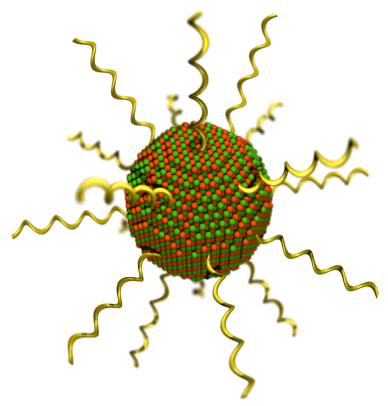Exciting nanostructures: Characterizing advanced confined systems
Bad Honnef Physics School
- Date:
- Su, 21.07.2019 18:00 – Fr, 26.07.2019 14:00
- Speaker:
- Christian Klinke (Swansea University), Nikolai Gaponik (TU Dresden)
- Address:
- Physikzentrum Bad Honnef
Hauptstr. 5, 53604 Bad Honnef, Germany
Description
Exciting nanostructures: Characterizing advanced confined systems
Scientific organizers:
Prof. Christian Klinke, Swansea University • Prof. Nikolai Gaponik, TU Dresden
July 21 - 26, 2019, Physikzentrum Bad Honnef, Germany
supported by


The developments in our society in terms of computing power, sensing, and alternative energy demand new generations of building blocks for future optical and electrical applications with higher efficiencies and lower costs. In the recent years enormous progress has been made in defining nanostructures and in understanding their physical properties. Nowadays, it is possible not only to prepare spherical, zero-dimensional nanoparticles, but also one-dimensional nanorods, two-dimensional nanosheets and hybrid materials. Structural design aims on developing of sophisticated core-shell and Janus nanoparticles, doped materials, and materials with specifically modified surfaces. Shape and structure have a strong influence on their physical properties which results mainly from their large surface-to-volume ratio and/or from the quantum confinement of their electrons and holes – but also plasmonic effects play a big role. The nanoobjects of various shapes can be further utilized as building blocks for even more sophisticated 2D or 3D assemblies. Scientifically, low-dimensional objects also represent exceptionally interesting model systems which allow the extension of classical and the development of alternative concepts on a new field of physics with ground-breaking insights. Examples are single-electron transistors, Coulomb blockade, ballistic transport over micrometers in length, and continuously tunable optical properties. To produce nanomaterials with new, tailored properties it is indispensable to understand the synthesis mechanisms in detail.
In this summer school the basics of the preparation of nanostructures, the resulting physical properties, their optoelectronic applications, and theoretical methods will be reviewed. A range of characterization techniques with a special emphasis on spectroscopy will be introduced. The summer school provides an ideal forum for Master and PhD students to become acquainted with the topic and to initiate further discussions. The participants are expected to present their own work in the form of posters. For the application for participation an abstract is required.
Confirmed Speakers:
- Alexander Eychmüller (TU Dresden)
- David J. Norris (ETH Zurich)
- Sandrine Ithurria (ESPCI Paris)
- Andres Castellanos (CSIC Instituto de Ciencia de los Materiales de Madrid)
- Vladimir Lesnyak (TU Dresden)
- Alexander Efros (US Naval Research Laboratory)
- Ilaria Ciofini (Chimie Paristech)
- Sergey V. Gaponenko (Academy of Science Belarus)
- Jannika Lauth (University of Hanover)
- Roberto Otero (IMDEA Madrid)
- Stephen Hickey (University of Bradford)
- Zeger Hens (University of Gent)
- Beatriz H. Juarez (IMDEA Madrid)
- Ute Resch-Genger (BAM Berlin)
FEES: 200 € full board and lodging (for DPG* members 100 € )
* The German Physical Society (DPG)
⇒ Schedule
⇒ Abstract booklet
⇒ List of confirmed participants
⇒ Poster
⇒ Talks and all previous Schools "Exciting Nanostructures"